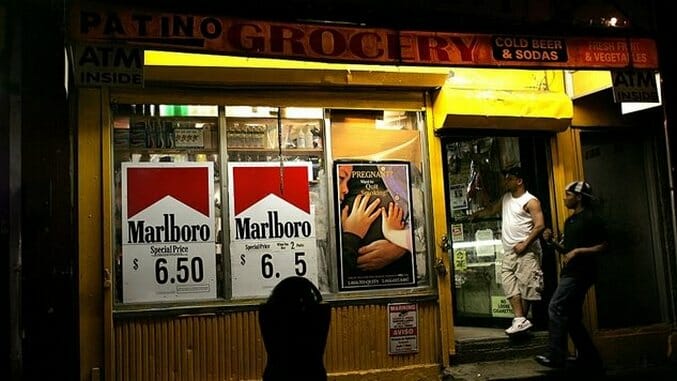“Bodega,” Silicon Valley’s Newest Idea, Is an Economic Assault on People of Color
Photo by Spencer Platt/Getty Politics Features Silicon Valley
The best companies always arise as a solution to a problem. I learned this during my time trying to start my own business, and every venture capitalist that I spoke to opened the conversation asking about the problem I aimed to fix, not my product. This is because those types of businesses are sustainable, and it creates a symbiotic relationship between their customers and the business itself. However, Silicon Valley has begun to abandon that maxim, preferring that everything be the “Uber for X.”
Which brings us to Bodega. They were profiled in Fast Company today, and the piece is filled with all the hallmarks of clueless Valley Dudebros.
Two ex-Googlers want to make bodegas and mom-and-pop corner stores obsolete https://t.co/FLaYGdwmFrpic.twitter.com/pqkWJ40xdW
— Fast Company (@FastCompany) September 13, 2017
Bodega isn’t original or innovative; it’s basically just extending the automation trend into the neighborhood corner store, but without the actual store. Per Fast Company:
Bodega sets up five-foot-wide pantry boxes filled with non-perishable items you might pick up at a convenience store. An app will allow you to unlock the box and cameras powered with computer vision will register what you’ve picked up, automatically charging your credit card. The entire process happens without a person actually manning the “store.”
So they invented a hotel mini-bar. Cool. Silicon Valley leads the world in creating things that already exist, and Bodega is an encapsulation of the lack of creativity in the Valley housing America’s new Robber Barons. What is so enraging about Bodega is that it doesn’t provide a real value proposition that goes above and beyond a neighborhood convenience store, and it explicitly states that they are out to attack the mom and pop shops instead of the giant conglomerates who rake in most of the revenue in this space. Additionally, the word “bodega” has a cultural meaning that makes this venture even more objectionable, as Frank Garcia, the chairman of the New York State Coalition of Hispanic Chamber of Commerce said:
“To me, it is offensive for people who are not Hispanic to use the name ‘bodega,’ to make a quick buck. It’s disrespecting all the mom-and-pop bodega owners that started these businesses in the ’60s and ’70s.”
Bodega is an elevator pitch for the vacuousness of Silicon Valley. A couple of Google Bros “invented” a box filled with stuff (also known as a vending machine), linked it to an app and poof—they secured funding from a litany of VCs and executives at Facebook, Twitter, Dropbox and Google. Silicon Valley aimed to lampoon this kind of stuff, but the existence of companies like Bodega demonstrates that the TV show is closer to being a documentary than satire.
Bodega’s value proposition literally is “we’re putting mom and pop stores out of business,” which doesn’t provide value to anyone but their investors. Bodega’s pitch is providing more convenience than a neighborhood store, which is like ditching your bedroom, sleeping on your couch and then calling it a bed. Sure, with Bodegas in offices or gyms, getting convenience store items is marginally easier, but it’s not like neighborhood convenience stores are difficult to find.
This is pure greed, plain and simple. This isn’t a new idea, nor is it one that will make people’s lives appreciably better—and to top it off, it’s wrapped in an offensive cocoon of cultural appropriation. Most new businesses follow the Innovator’s Dilemma model—where they step into a vacuum left by a larger firm chasing profits at higher levels. But Bodega eschews that proven archetype for straight theft, copying the convenience store model that has worked for nearly a century, but removing humans from the equation. Bodega reveals the logical conclusion of most Silicon Valley “innovation:” a world without workers.
Growing up, Baby Boomers were told that they would have flying cars and cities on the moon by this point. Millennials were led to believe that the Age of the Web would bring a new kind of enlightenment, as the amount of resources at our fingertips is nearly equal to that of ancient Kings. Instead, we have no moon-colonies, a million different versions of the same car and the internet has more disinformation than information. Growing up means realizing the world is one big lie.
Bodega is but one tiny portion of a larger web of deceit created by America’s largest hub of innovation. Silicon Valley doesn’t make products for people—they make products that deliver people’s data to their investors, as that is where the real money lies. Google became a real-life version of Skynet by simply selling search data to advertisers. The business that I launched was basically a social networked wrapped around an RSS library, and I quickly realized that the true value proposition of it—at least as far as investors were concerned—was the litany of data I would have on my users reading habits. I spent far more time talking to investors about how I could take people’s data to make them rich than how I would use my product to make people’s lives better. We are but cogs in the Valley’s big data machine, and companies like Bodega are an outright assault on human livelihood, all in the name of more profits for those who don’t need it.
Jacob Weindling is a staff writer for Paste politics. Follow him on Twitter at @Jakeweindling.